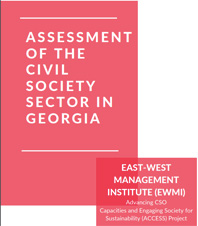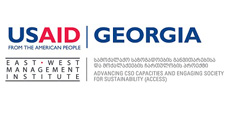
Georgian Civil Society Assessment initiative launched by EWMI ACCESS and CTC
By Nika Gamtsemlidze
Friday, January 10
Georgian Civil Society Assessment initiative, which was carried out in 2019, was launched by EWMI ACCESS and Center for Training and Consultancy (CTC).
The report explores the status of civil society in Georgia from 2012 to late 2018. In particular, it examines the performance of the CSO in four areas: public trust and legitimacy, policy influence, sustainability and viability, and intersectoral cooperation
The study focuses on the transition experienced by Georgia in 2012 when the Georgian Dream party won the parliamentary elections. The study also focuses on current challenges on the country, including threats from Russia, the electoral and judicial reforms, as well as media independence.
As the study reads, CSOs have been instrumental in safeguarding and advancing Georgia’s democratic progress, and this has been particularly salient in areas such as individual rights, non-discrimination, and tolerance, where Georgia has traditionally been leading among the Eastern Partnership countries and in the wider region.
According to the studies, one of the challenges with the SCOs in the low participation of the wider public in its activities.
The study reads that according to official sources, there are more than 27,000 registered CSOs in Georgia. This would amount to an extremely vibrant civic life in the country, but the numbers are misleading as many of these organizations exist in name only; procedures for closing the legal entities in Georgia is a cumbersome and time-consuming affair, and many prefer to avoid the hassle of officially disbanding their organizations.
Also, as the report says, according to the latest edition of the Caucasus Barometer, in 2017, the number of people trusting and distrusting CSOs stood at 23 each. This is lower than in 2012 when those who trusted CSOs outnumbered their counterparts with a ratio of three to one (27 percent to 9 percent)
The study also lists recommendations for Civil Society Organizations: Increase communication effectiveness to reach out to wider public; Increase efforts to engage citizens in their activities; Increase intra-sectoral cooperation; Increase efforts to diversify financing; Increase efforts to engage with the private sector; Increase activities in all areas important to the public; Find innovative solutions and initiatives through increased use of the co-creation/Social Lab approach and increase capacity for policy formation.
The study was carried out by the research team headed by Dr. Bakur Kvashilava, Dean of the School of Law and Politics at the Georgian Institute of Public Affairs (GIPA).


